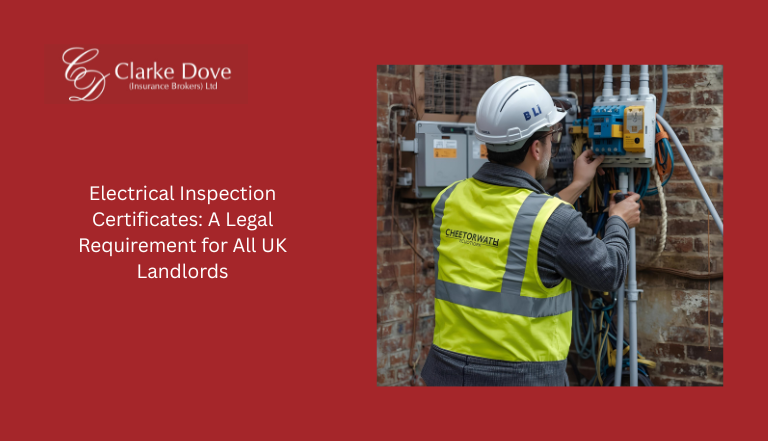
As a property owner in the UK, staying compliant with evolving landlord legislation is
crucial for protecting both your tenants and your investment. One of the most
significant recent changes has been the mandatory requirement for Electrical
Inspection Certificates in all rented residential properties. Whether you’re managing
a single buy-to-let property in Nottingham or a portfolio across the East Midlands,
understanding these requirements is essential for legal compliance and maintaining
your landlord’s insurance coverage.
What is an Electrical Inspection Certificate?
An Electrical Inspection Certificate, formally known as an Electrical Installation
Condition Report (EICR), is a comprehensive safety assessment of the electrical
systems within a property. This detailed inspection evaluates the condition of
electrical installations, identifies potential hazards, and ensures all wiring, sockets,
switches, and electrical appliances meet current safety standards.
The certificate provides a clear overview of any electrical defects, from minor issues
requiring attention to serious hazards that pose immediate danger to occupants. For
property owners, this document serves as both a legal compliance tool and a
valuable maintenance guide, helping to keep properties safe and marketable.
Legal Requirements and Timeline
Since July 2020, all new tenancies in England have required a valid EICR before
tenants move in. From April 2021, this requirement extended to all existing
tenancies, making electrical safety certificates mandatory across the entire private
rental sector.
The key legal requirements include:
Initial Inspection: Properties must have an EICR conducted before any new
tenancy begins
Regular Updates: Certificates must be renewed every five years, maximum
Immediate Action: Any issues classified as C1 (danger present) or C2 (potentially
dangerous) must be remedied by a qualified electrician before letting
Tenant Access: Landlords must provide tenants with a copy of the current certificate
Failure to comply can result in fines of up to £30,000 per property, making this one of
the most significant financial risks facing property owners today.
Impact on Landlords’ Insurance and Buy-to-Let Coverage
The introduction of mandatory electrical certificates has significant implications for
insurance coverage. Most insurers now require valid EICRs as a condition of
landlords’ insurance policies. Without proper certification, property owners may find
their insurance claims rejected, leaving them financially exposed.
Insurance brokers across Nottingham and the wider East Midlands report that many
buy-to-let insurance providers are increasingly stringent about electrical safety
compliance. Some key considerations include:
- Policy Validation: Many insurers require sight of current EICRs during policy renewal
- Claims Processing: Electrical-related incidents without valid certificates may void coverage
- Premium Implications: Properties with outstanding electrical issues may face higher premiums
- Risk Assessment: Up-to-date certificates can sometimes help secure more competitive insurance rates
How to Obtain an Electrical Inspection Certificate
Securing an EICR involves several straightforward steps, though property owners
should plan to ensure compliance:
Find a Qualified Electrician
Only qualified electrical contractors registered with approved schemes are permitted
to conduct EICRs. Look for electricians registered with:
- NICEIC (National Inspection Council for Electrical Installation Contracting)
- NAPIT (National Association of Professional Inspectors and Testers)
- ELECSA
- STROMA Certification
Schedule the Inspection
The inspection typically takes 2-4 hours, depending on property size and complexity.
The electrician will test all electrical circuits, examine the consumer unit (also known
as a fuse box), and inspect the visible wiring throughout the property.
Review the Report
EICRs classify findings using a coding system:
- C1: Danger present – immediate remedial action required
- C2: Potentially dangerous – urgent remedial action required
- C3: Improvement recommended – non-urgent
- FI: Further investigation required
Address Required Remedial Work
Any C1 or C2 issues must be rectified before the property can be legally let. The
same electrician can often complete necessary remedial work immediately following
the inspection.
Maintain Records
Keep copies of all electrical certificates, remedial work receipts, and
correspondence. These documents are essential for processing insurance claims,
addressing tenant queries, and facilitating future property sales.
Working with Insurance Brokers
Given the complexity of modern landlords’ insurance requirements, many property
owners in the East Midlands find value in working with specialist insurance brokers.
Clarke Dove understand the interplay between safety compliance and
insurance coverage, enabling property owners to maintain appropriate protection
while managing costs effectively.
When discussing coverage with insurance brokers, ensure they understand your
commitment to electrical safety compliance and can structure policies that reward
proactive property maintenance.
For more information on our buy to let products click here
Practical Tips for East Midlands Property Owners
- Book EICR inspections well before certificates expire, especially during busy periods.
- For multiple properties, create a maintenance calendar tracking all certificate expiry dates.
- Inform tenants about inspection schedules and any temporary disruptions.
- Maintain digital copies of all certificates for easy access during insurance renewals.
- Build relationships with qualified local electricians for ongoing maintenance needs.
Conclusion
Electrical Inspection Certificates represent more than just another compliance
requirement – they’re an essential component of responsible property management.
For property owners across Nottingham and the East Midlands, staying ahead of
these requirements protects tenants, preserves insurance coverage, and maintains
investment value.
The integration of electrical safety compliance with landlords’ insurance
requirements means property owners can no longer treat EICRs as optional extras.
Instead, they should be viewed as fundamental operational requirements, like gas
safety certificates or energy performance certificates.
By working proactively with qualified electricians and Clarke Dove,
property owners can ensure their investments remain profitable, compliant, and
adequately protected. The small investment in regular electrical inspections pays
dividends in tenant safety, legal compliance, and peace of mind.
For buy-to-let investors, particularly those building portfolios in the competitive East
Midlands market, demonstrating commitment to electrical safety can become a
significant competitive advantage, attract quality tenants, and maintain robust insurance protection.
